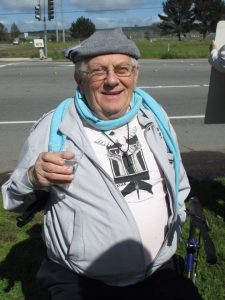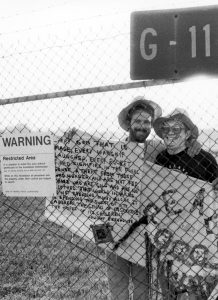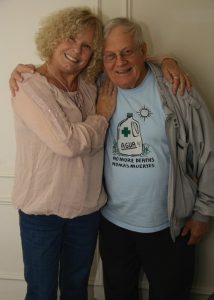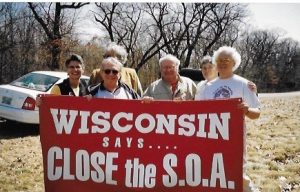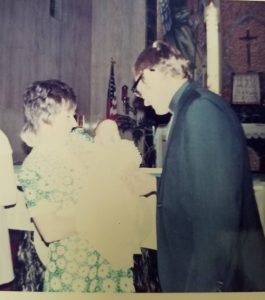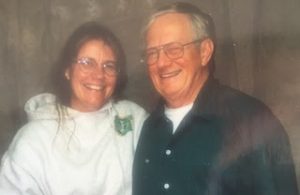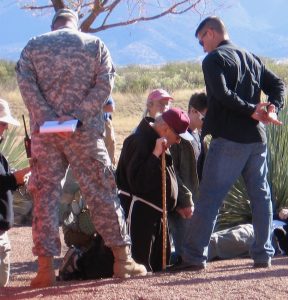There was a peace vigil to honor the life of Fr. Jerry Zawada on Monday, November 13 at Davis-Monthan AFB in Tucson, Arizona, followed by a celebration of his life (photos, readings, etc. are posted here).
Fr. Jerry Zawada OFM – nuclear resister, peace and justice activist, Franciscan friar – died on the morning of July 25 at the age of 80. Jerry served his early years as a Franciscan priest in the Philippines, and later worked with the homeless, war refugees and survivors of torture in Chicago, Milwaukee, Mexico, Las Vegas, Tucson and elsewhere. Jerry was imprisoned for two years in the late 1980s for repeated trespass at nuclear missile silos in the midwest; served three six-month prison sentences (2001, 2003, 2005) for trespass at the School of the Americas in Fort Benning Georgia, and two months in prison in 2007 after crossing the line to protest torture training at Fort Huachuca, Arizona. A few years ago, his advocacy for and celebration of mass with women priests earned a disciplinary letter from the Vatican.
He never stopped standing up and speaking out for a peaceful, just and nuclear-free world, even when in recent years he slowed down physically and wasn’t quite sure how fast his legs would carry him. His life will remain an example and inspiration to so many – those who knew and loved him, and those he never had an opportunity to meet.
Jerry Zawada Fan Club
Mariah’s column on the Underground heroes of the movement
I have a hero who is everything a hero needs to be: he’s kind and loving but at the same time just and humble; he takes his vocation seriously and has given his whole life to the cause of peace. His name is Jerry Zawada and he is a “retired” Franciscan priest currently living in Arizona doing the much-needed work of supporting migrants on the Border. To try and describe what makes Jerry so amazing in a few short paragraphs is almost impossible—in fact, I put off writing this because I knew it would be so hard. So forgive me Jerry and fellow Jerry Z. fan club members, as I attempt to put to words just how amazing this man truly is. When I first met Jerry he was just coming out of jail for a protest that he was involved with, and I quickly learned that he was no stranger to breaking rules. In fact the religion teacher at his Jesuit school had told him not to enter the priesthood because he broke rules just to break them (just to clarify, Jerry says that he doesn’t break rules just to break them, but if he doesn’t see the purpose of a rule, he’s not going to go out of his way to follow it). So he went and became a Franciscan priest, and he’s been keeping them on their toes ever since. A tireless advocate for war and torture victims, he’s been to Iraq during the sanctions, bringing supplies and teaching the kids “jingle bells.” He’s been arrested three times at the School of the Americas and once at Fort Huachuca, not to count out his countless arrests at other military bases in defiance of war and militarism. The man has given his whole self to God and his fellow brothers and sisters, and refuses to take any praise for it in return. When I first told him I wanted to make a Jerry Zawada fan club, he asked “what for, I haven’t done anything.” But he has done something—he has motivated people around him to live a more humble and loving life. Through his experiences and thoughts he has inspired me to live closer to God and his people. Even though he hasn’t written hundreds of books on faith and action, and even though he may not be the head attraction at a rally or vigil, he is truly what Jesus intended when he called us to serve his people.
And so I proclaim to the world:
Jerry Zawada= Supreme Badass and deserving of a fan club
Jerry Zawada, quiet, powerful presence in peace movement, dies
It was August 1988, in the midst the Missouri Peace Planting campaign against nuclear weapons. Shortly after he and another activist broke into the silo site — the priest celebrated a liturgy on the hatch — armed soldiers escorted them away and ordered they lay face-first on the ground with their arms outstretched until they were handcuffed. The experience, Zawada later recalled, triggered a sort of muscle-memory event to a quarter century earlier when in making his vows he lay prostrate before the altar.
To Zawada, it reaffirmed that this was the place he belonged, where his vocation as a priest had called him.
A quiet but persistent presence in the anti-nuclear and peace movements of the past three decades, Zawada died peacefully July 25 at the Milwaukee Catholic Home continuing care facility. He was 80 years old.
“He was a Franciscan and follower of St. Francis to the end,” his longtime friend Franciscan Fr. Louie Vitale told NCR, the two frequent companions during protests against nuclear weapons, drones and wars and conflicts.
“He greatly loved Jesus and the chance to follow a nonviolent Jesus and exemplify Franciscan values of living simply and sharing resources,” said Kathy Kelly, a Chicago peace activist and co-coordinator of Voices for Creative Nonviolence.
Zawada’s belief in nonviolence led him across the globe: Guatemala, Iraq, the West Bank, the U.S.-Mexico border in Arizona and Texas, and numerous military bases and facilities across the country.
His friends and fellow activists remember Zawada as a humble servant of humanity with a droll sense of humor, a gentle man with a heart large enough for all and incapable of offense, a priest who most identified with the down and dejected. Whether Central American refugees at the U.S. border, those caught amid war in Iraq and Afghanistan, the poor and gang members of Chicago, the imprisoned and others decades-deep in the peace movement, Zawada was a friend to all.
Franciscan Fr. James Gannon, provincial minister of the Franciscan Friars of the Assumption BVM Province, in Franklin, Wisconsin, called his fellow friar “a prophet for peace and justice.”
“He always would say he believed what he did was God’s will. And that was his faith, that he was following God’s will,” Gannon said.
Zawada’s convictions also led him to believe that women had a right to ordination in the Catholic Church — a belief that resulted in his removal from public ministry by the Vatican after he concelebrated a liturgy with a woman priest during a 2011 protest of the School of the Americas.
“He just didn’t believe in second-class citizens … so in terms of the Catholic Church, the idea that women would ever be treated as unequal to men was unacceptable to him,” Kelly said.
“Wherever he heard of a cause, he was there,” Vitale said. “And wherever there was somebody in need of somebody to stand by ’em, he was there, even in prison. … He was always there for the underdogs.”
A Franciscan life
Zawada was born April 28, 1937 outside Gary, Indiana, the second oldest of seven children to his Polish immigrant parents. In a 2006 interview conducted by The Nevada Test Site Oral History Project at the University of Nevada-Las Vegas, he said he felt called to the priesthood from an early age, drawn to the compassion and values of Jesus, as well as the example of St. Francis of Assisi. Later in life, Blessed Archbishop Óscar Romero became another of his heroes.
In 1955, Zawada entered the Franciscan community. He made his first vows a year later, his solemn vows in August 1963 and was ordained a priest on June 13, 1964. His first assignment took him to the Philippines. In the early 1970s, he lived and worked among the poor and gang members on Chicago’s North Side. The stresses of that work brought about severe clinical depression for Zawada, and he ultimately took a year-and-a-half leave of absence from the priesthood.
He returned to the Franciscans in 1983 and soon headed to San Antonio to study Spanish. While in Texas, Zawada said his life changed, as he shed his discomfort and fear in working with people of need and discovered a way to serve them. In his oral history, Zawada credited his newly inspired outlook to Maria Alicia Rivera, a Salvadoran school teacher who shared her story of torture by the military in El Salvador as she fought for the rights of the poor and fellow teachers.
“And it dawned on me almost like a light, I could not not do something,” Zawada said. “I didn’t have to take away anybody’s pain. I just needed to walk with them and learn from them and maybe somehow, I describe it in my religious terms as seeing the face of Christ, and working along those lines just learning from them, accompanying them in their plight and then hopefully to work with others for some type of resolution and relief.”
That also meant becoming more political. Initially, he helped transport people fleeing conflicts in Central America across the U.S.-Mexico border in southern Texas. He was arrested for the first time in Chicago in 1984 while protesting CIA involvement in Nicaragua. In the following decades, the Franciscan friar by his count would be arrested more than 100 times, and he served the cumulative of roughly five years in prison for his various acts of civil disobedience.
At times, Zawada’s involvement in protests led to clashes with other clergy and his superiors. But he viewed his obedience as to God and the Gospel, and saw the work as following God’s will.
One of his first major involvements with the peace movement came with the group Missouri Peace Planting ’88, in which 14 activists visited some of the 150 nuclear missile silos in northwest Missouri, outside Kansas City, and prayed and planted corn and crosses over the sites.
“We sang. We prayed. We joined hands,” Zawada recalled of the actions. “When the military did come to take possession of us, we even invited them to join us if they so felt, to pray. And it was very meaningful, the whole thing; we did a lot of good things, symbolic things.”
Zawada was arrested five times throughout the effort — the fifth time on the feast of St. Francis — and was sentenced to 25 months in prison.
“Jerry was just unhesitating in saying after we would be released that he was ready to go right back. And he did that again and again, knowing that this would certainly occasion prison time,” Kelly said.
The time in prison served not as punishment to Zawada but as the place of his greatest ministry.
“For him, going to prison wasn’t a bad thing,” his Franciscan provincial Gannon said.
In the times he was behind bars, Zawada befriended those sentenced to life, led prayer services and started Bible studies for fellow inmates, and became their advocate.
“He found that [those in prison] felt that they were not worth it, that they were bad people, and I think Jerry reassured them that they weren’t, that they were good people and they were God’s people,” Gannon said.
Outside his prison stints, Zawada joined the likes of Kelly, Jesuit Fr. Dan Berrigan and others in protesting the Gulf War and the Iraq War. In April 2009, Zawada was among the “Creech 14” — along with Kelly, Vitale, Fr. John Dear, and Sr. Megan Rice — who held a prayer service at Creech Air Force Base in Nevada against the military’s use of drones.
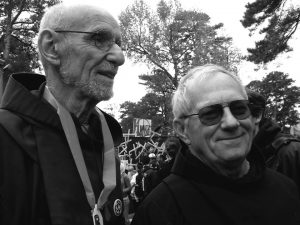
November 2015, Fr. Louie Vitale OFM and Fr. Jerry Zawada OFM before crossing the line onto Ft. Benning
Throughout the years, Zawada was a regular at the annual SOA Watch protests of the U.S. Army’s School of the Americas, now called the Western Hemisphere Institute for Security Cooperation. He was arrested three times at the protests, held in Columbus, Georgia, north of Fort Benning that houses the school, and served a total of 18 months in prison.
But it was an SOA Watch liturgy in November 2011 that would lead to Zawada’s formal removal from priestly ministry. That year, he joined woman priest Janice Sevre-Duszynska, who was ordained in 2008 through the Association of Roman Catholic Women Priests, in a liturgical service for more than 300 people. He later told NCR that he also concelebrated with Sevre-Duszynska, a close friend and fellow activist, in 2010.
Following the 2011 liturgy, Zawada said that the service presented him the opportunity to “support the movement” for women’s ordination, an issue he said he has given consideration to for “quite a long time,” adding that the structure of the church “needs reshaping.”
“Whatever consequences come for me, I’m willing to accept,” he said of possible punishment for his participation.
Recent years
In March 2014, he received a letter from the Vatican’s Congregation for the Doctrine of the Faith that removed him from ministry and directed him to “a life of prayer and penance.” As part of his removal, he was restricted from presenting himself in public as a priest or celebrating the sacraments publicly, something his provincial at the time Franciscan Fr. John Puodziunas said he hadn’t done in recent years.
The letter didn’t deter Zawada’s support of women priests, or married priests, and he took comfort in supposed remarks from Pope Francis to a group of Latin American nuns and priests that should they find themselves under doctrinal scrutiny, “do not worry. Explain whatever you have to explain, but move forward.”
Even as age weakened his body, his spirit to continue his vocation remained strong.
“Every single one of my dreams at night are dreams about living and sharing life with the poor, with people who are destitute, and I sense I have a strong calling for that,” he told NCR in March 2014.
Zawada demonstrated in 2013 against construction of a nuclear weapons facility near Kansas City, Missouri. In the span of five days in March 2015, he was among those arrested at protests against nuclear weapons and drones in California and Nevada. In recent years, he desired to return to the border to assist immigrants.
This February, Zawada suffered the first of a series of debilitating strokes. He spent the final weeks of his life on hospice, with friends and family paying visits and making calls.
Throughout his time in the peace movement, Zawada developed a reputation for his quiet yet powerful presence. Perhaps less known than other activists to the public, within the peace movement he was “loved and regarded highly for all this,” said Brian Terrell, a lifelong Catholic Worker and fellow member of the Creech 14. At one point, several Catholic Workers formed a “Jerry Zawada Fan Club,” an honor he declined, uncomfortable with the attention.
“I have a hero who is everything a hero needs to be: he’s kind and loving but at the same time just and humble; he takes his vocation seriously and has given his whole life to the cause of peace. His name is Jerry Zawada,” Mariah Klusmire, a Catholic Worker living in Albuquerque, wrote in 2009.
“The man has given his whole self to God and his fellow brothers and sisters, and refuses to take any praise for it in return,” she said, adding that he has inspired those around him “to live a more humble and loving life.”
Klusmire concluded: “Even though he hasn’t written hundreds of books on faith and action, and even though he may not be the head attraction at a rally or vigil, he is truly what Jesus intended when he called us to serve his people.”
A Mass of Christian burial for Zawada is scheduled for Aug. 2, at 1 p.m., Central time, at St. Clare Church in Wind Lake, Wisconsin, with a visitation preceding it.
[Brian Roewe is an NCR staff writer. His email address is broewe@ncronline.org. Follow him on Twitter: @BrianRoewe.
xxx
Two Kinds of Light and Jerry Zawada
by Toni Flynn
On August 6th of this year, we remember the Light of Christ – the dazzling robes and radiant appearance of Jesus transfigured on the high mountain in the company of Moses and Elijah. “This is my beloved Son,” says a voice from an overhead cloud to the Apostles who had accompanied Jesus. “Listen to Him”.
On the same day, we commemorate the blinding and unspeakably destructive light of the Atom bomb dropped by U.S. military aircraft destroying the Japanese city of Hiroshima toward the end of World War II and resulting in the deaths of 140,000 men, women and children. And, three days later, we commemorate the horrifically devastating light of a second U.S. atomic bomb detonated over Nagasaki resulting in at least 80 thousand casualties.
In the wake of immense shock and unbearable suffering, burying and mourning their dead by the thousands and slowly rebuilding, the citizens of Hiroshima and Nagasaki could have easily become vengeful and unforgiving. Instead, they have constructed peace museums and memorial parks, opening them to people from all over the world including U.S. citizens. They choose to see the light of hope and renewal where once there was only darkness and devastation.
On September 11, 2001, darkness and destruction descended from the air onto U.S. soil. Airplanes collided into buildings in Washington D.C. and New York City. Another crashed on a field in Virginia. Flashes of fire burned into buildings and people. Plumes of smoke blocked the light. Heroes abounded and most lost their lives too. Los of life rose to 3000 citizens. From initial shock, grief and mourning, a stronger wiser community began rising up to work for peace, following the example of Hiroshima and Nagasaki. Unfortunately, that soon gave way to a national call for revenge and violent retaliation. The target was Iraq.
A week before the U.S. first began bombing Iraq, I telephoned my Franciscan friend, Jerry Zawada, who was volunteering at an orphanage in Baghdad. It felt surrealistic to dial Baghdad direct and to hear the voice of an Iraqi man greet me at the other end of the line. Suddenly, my life was connected to the life of an Iraqi citizen who lived in a city that – up to that moment – was only known to me from reports on T.V. and articles in the newspapers. The man spoke very broken English. When I explained that I was an American living in California, trying to contact Fr. Jerry to see if he was OK, he began to cry, “Fr. Jerry is our light. I will get him for you, please stay on the phone. And please, he pleaded through halting sobs, please missus, please tell your leaders not to bomb here. My wife is to have a child. For our unborn. For our orphans. Pray please.”
I remember very little of my conversation with Jerry because this poor man’s voice of sorrow and fear, his love and concern for his wife and unborn child, kept echoing in my head and in my heart. What I do remember is that Jerry’s voice was uncannily calm, as he gently conveyed to me that he knew God was calling him to remain in Baghdad for as long as possible for the sake of the children at the orphanage. He too urged me to pray.
Basically, I’m more of a poet than an activist and certainly am not a politician or a warrior. So I tend to sense the collective pain of all peoples on all sides of all borders who suffer and die untimely, unkind, cruel and terrible deaths at the hands of other human beings. To this day, I agonize over the fate of the Iraqi man whose life bonded with my life for moments over a telephone connection. What happened to him, to his wife, to his unborn child, to the neighboring orphans? Did the man and his wife suffer injuries when the bombs fell? Did they lose limbs? Did they and their yet to be born baby perish? Fr. Jerry was evacuated from Baghdad before the bombing began and I know he too felt the pain of not knowing. Sadly, for those of us who loved him, Jerry didn’t live to see August of this year though I know that he basks in God’s light as I write this.
Even Jesus’ brilliance on the mountain was shadowed by a cloud. His own suffering and death was on the horizon and His words were not often taken seriously. “This is my beloved Son. Listen to Him.” Sometimes when reading through the Gospels, I view Jesus’ teachings as invitations to embrace the Light of Christ rather than the instruments of death that all too often continue to light up the skies of the earth. Iam the I Light of the world … make certain that the light in you is not darkness … whoever does what is true comes into the light of God … let your body be the light that shines for others like alamp. I am certain that Jerry listened. But have we yet to fully listen to Him?
xxx
by Laurie Melrood
You asked for memories – here’s a long one. The man you call Fr. Jerry has never been Fr. Jerry to me. He has and always will simply be Uncle Jerry, my Godfather, or as he would sign his cards to me “the Godfather.” If anyone was to ask me how Fr. Jerry was or say something about it, I would look a little puzzled and translate in my head or actually say “oh you mean Uncle Jerry”.
My memories are different than yours. My early memories are a lack of memories. As a small child Uncle Jerry wasn’t home a lot. It was honestly heartbreaking as a child to learn your uncle and Godfather would not be there for important events in your life including your birthday parties. A child doesn’t understand that he had a higher calling. A child just wants her uncle home to play with and talk to you and be there for the important events in your life. Honestly, as an adult I still would have rather had Uncle Jerry home instead of traveling the country doing his calling. As a child, I really didn’t know he was a priest. He didn’t wear his priest uniform while home and no one ever addressed him as Fr. Jerry.
Uncle Jerry traveling the country and protesting caused the family lots of stress and worry. We never wanted him arrested or in jail. When he served long sentences in jail I was in high school. I used to like to shock people about him being in jail. I would say “my uncle the priest was in jail for hopping a fence.” And wait for people to be shocked by that. I would then add “well, there happened to be a nuclear warhead site on the other side of the fence.” The time in jail caused him to miss my high school graduation.
Uncle Jerry took a leave when my grandpa got sick, and stayed close to home until my grandma passed away. So, we were lucky. We saw a lot of Uncle Jerry and got used to him being around. I saw more of Uncle Jerry as a young adult than as a child. I did always ask him about his protests when I was a teenager but my biggest question was always “did you see Martin Sheen?” He would always let me know when he did and tell me some of the conversations. As a child of the 80s in love with movies I was very much aware of who Martin and his sons were.
Uncle Jerry was there to help us through some of our dark moments, and was able to share in some of the joys in our life. These are only a few of the memories of Uncle Jerry. But how do you condense 44 years of memories? How do you remember everything when a lot of the memories are simply being at Grandma & Grandpa’s house having a meal?
One thing I do remember is Uncle Jerry saying Mass in my Grandparent’s living room. There were several Christmas Eve’s or Saturday evenings where my cousins and I convinced Uncle Jerry to say Mass. Go to Mass in Grandma & Grandpa’s living room sitting on the couch or floor in your stocking feet or having to get up early and sit in a stiff church pew? You know our answer. The best part was high 5ing your cousins because you didn’t have to sit through 2 hours of Christmas carols to ensure you had a seat in the crowded church and your Mom not being able to argue because they knew Uncle Jerry’s Mass at Grandma & Grandpa’s counted as going to Mass.
So, do I miss him? Tremendously. But I know he’s with my grandparents and my cousin Doug watching over my family keeping us safe. I have his cards and notes he wrote to me, my husband, and my kids. He will always be Uncle Jerry “the Godfather” to me. He will never be Fr. Jerry the activist to me.
xxx
Read more here.
“Some of you have heard me tell this story. It is one of my favorites. With his passing, I thought I would share it again.Jerry Zawada was arrested with my mom about two years ago for protesting (trespassing) at Creech Air Force Base. When it came time for trial he started his opening statement with “I did it because. . .” He explained that he would rather risk his freedom than stand by while children are being killed by US bombs.
As witnesses were called to testify against him, he waved eagerly at them with a giant smile. He had no cross examination. He called no witnesses. He mentioned that he thought a particular officer had done a “very good job” testifying against him, and he interrupted the proceedings at one point to let the judge and prosecutor know that he was actually on probation. When asked if he would like to make a closing statement, he said that he felt the prosecutor had done a great job and “pretty much covered everything.” He was found NOT GUILTY. (How is this real life?!)
But that isn’t even the end of the story.
My mom’s case was called next. The DA had no choice but to dismiss. My mom protested the dismissal and insisted that she be allowed to make an opening statement. The judge allowed it, incredulously. Then, over the next two days the other 14 defendants made opening statements AFTER their cases were dismissed.
And that’s the parallel universe I lived in for two days, thanks to this wonderful human.
from the Su Casa Kairos newsletter
MILWAUKEE, WI – Fr. Jerome Zawada, OFM, age 80, passed away on July 25, 2017, at the Milwaukee Catholic Home, in Milwaukee, WI.
Jerry was born on April 28, 1937 in East Chicago, IN to Valentine and Albany (nee Ladowicz) Zawada. Jerry grew up in East Chicago and Hammond, IN. He graduated from St. Bonaventure High School and Minor Seminary in Sturtevant, WI. After high school, Jerry entered the novitiate in Lake Geneva, WI. He attended St. Francis College in Burlington, WI and Christ the King Seminary in West Chicago, IL.
Jerry was ordained a Franciscan Priest on June 13, 1964. Later that same year, Jerry began his ministry in the Philippine Islands where he taught, served in a parish, and visited many barrios in isolated mountain areas for seven years. He embraced the idea of helping the very poor-even those of other faiths and cultures. Food was scarce for everyone. It took a heavy toll on the people, and on Jerry himself. After the Philippines, Jerry moved around to live among and minister to the poor and marginalized. He served God in ‘many’ places around the United States, and abroad.
In many ways, Jerry modeled the simple, direct spirit and life of St. Francis of Assisi. Jerry was generally a quiet man, but with strong convictions. His quest for the truth, peace and justice often challenged authority. Notoriety for himself was not important. He went on a humanitarian mission in Iraq, risking his life and visiting hospitals, orphanages mostly consoling the innocent young victims of war. Jerry worked for the Catholic Worker Movement for several years to serve the poor, homeless, and hungry in our own country. He learned Spanish to help many oppressed Latinos survive. He also made unselfish efforts to help refugees of other nationalities, some whom were tortured in other countries seeking asylum in the United States. He also had very strong convictions about the dangers posed by nuclear missiles and served several prison sentences to exhibit his passionate stance. Some may have looked at Jerry as being a radical, but like St. Francis, he was dedicated to the teachings of Christ. Fr. Jerry even questioned the rules of the church when they did not make sense to him. He firmly believed that there should be more equality regarding women and men in the Roman Catholic Church. Jerry’s focus was on human beings, never possessions. He embraced a simple lifestyle. Jerry did not always have solutions to take away the pain of others, but he always tried to walk their journey with them. He really listened, and he really cared. And he embraced a delightful sense of humor. Jerry loved his friends and family. We will never forget his unselfish devotion to our Mom and Dad during the final years of their lives. Our Lord truly made Jerry a man of Christ, and an instrument of His peace.
Jerry’s family includes brothers and sisters Valerie (Tony) Lenzo; Dave (Judie) Zawada; Dan (Linda) Zawada; Diane (Fred) Price; Joan (Jerry, late) Meece; and Debbie (Joe) Woloch. Many loving nephews, nieces, great-nephews and great-nieces, cousins, godchildren, and many special friends.
Our family would like to express a special thank you to Nurse Char who carefully and lovingly monitored Jerry’s health during the past few years. And thanks and recognition to the Milwaukee Catholic Home staff who took loving care of Jerry during the past months.
A Mass of Christian burial is scheduled for Wednesday August 2, at 1:00 PM Central Time, at St. Claire Catholic Church, 7616 Fritz Street, Wind Lake, Wisconsin, with an 11:00 AM visitation preceding it. A cremation burial will follow at a later date to be determined. In lieu of flowers memorial donations can be made to ‘Casa Maria Catholic Worker’ at PO Box 05206, Milwaukee, WI 53205; or ‘Franciscan Friars of the Province of the Assumption of the Blessed Virgin Mary’ at PO Box 100, Pulaski, WI 54162. In Jerry’s memory, please pass forward acts of kindness and compassion as Jerry did every day of his life.
